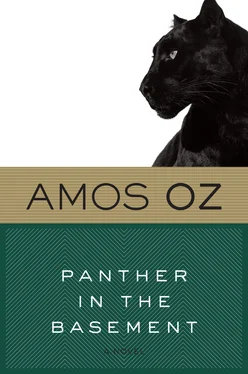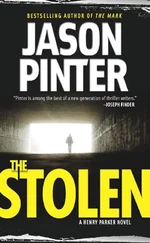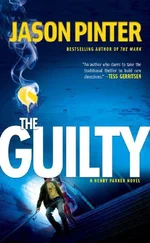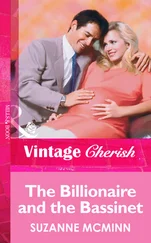Nothing helped. Things were bad.
This is how I remember Jerusalem in that last summer of British rule. A stone city sprawling over hilly slopes. Not so much a city as isolated neighborhoods separated by fields of thistles and rocks. British armored cars sometimes stood at the street corners with their slits almost closed, like eyes dazzled by the light. And their machine guns sticking out in front like pointing fingers: You there!
At dawn the boys would go around sticking up posters from the Underground on walls and lampposts. On Saturday afternoons, in our backyard there were arguments with guests and a procession of glasses of scalding tea and biscuits that my mother made (and I would help her by printing star and flower shapes on the soft dough). In the course of these arguments both the guests and my parents would use words like "persecution," "extermination," "salvation," "intelligence," "heritage," "clandestine immigration," "siege," "demonstrations," "Haj Amin," "extremists," "kibbutzim," "the White Paper," "the Hagganah," "self-restraint," "settlements," "gangs," "the conscience of the world," "riots," "protests," "clandestine immigrants." Occasionally one of the guests would get carried away; often it would be one of the quiet ones, a skinny, pale-faced man with a cigarette trembling between his fingers and a shirt buttoned up to the neck, whose pockets were stuffed with notebooks and slips of paper, and he would explode with polite anger and shout expressions such as "like sheep to the slaughter," "Protected Jews," and then he would hurriedly add, as though in an attempt to correct the bad impression, "But we must on no account allow ourselves to be split, heaven forbid, we are all in the same boat."
The empty laundry room on the roof was fitted up with a washbasin and electric light, and Mr. Lazarus, a tailor from Berlin, moved in. He was a small man, who blinked and nodded, and despite the heat of the summer he was always dressed in a shabby grey jacket and a waistcoat. And he always carried a green tape measure around his neck, like a necklace. His wife and daughters, people said, had been murdered by Hitler. How had Mr. Lazarus himself managed to survive? There were various rumors. Uncertainties. I had my doubts: What did they know? After all, Mr. Lazarus himself never said a word about what had happened. He put up a card in the entrance hall, half in German that I could not understand and half in Hebrew that he asked my mother to write for him: "Expert tailor and cutter from Berlin. Commissions of all sorts undertaken. Alterations to order. Latest fashions. Reasonable prices. Credit available." After a day or two somebody tore off the German half: we would not tolerate the language of the murderers here.
My father found an old woolen cardigan at the back of the wardrobe and sent me up to the roof to ask Mr. Lazarus to be good enough to change the buttons and strengthen the seams. "Yes indeed, it's only an old rag, possibly unweara-ble," Father said, "but he seems to be hungry for bread up there, and charity is offensive. So let's send it up to him. He can change the buttons. Earn a few piasters. Make him feel he's appreciated."
My mother said:
"All right. New buttons. But why send the boy? Go yourself, talk to him, ask him in for a glass of tea."
"Definitely," said Father, sheepishly, and a moment later he added decisively: "Yes indeed. We must definitely invite him."
Mr. Lazarus fenced in the far corner of the roof with old bedsteads, reinforced with wire, and made a kind of coop or cage, spread out some straw from an old mattress, bought half a dozen hens, and asked Mother to add in Hebrew on the remaining half of his notice: "And fresh eggs for sale." But he would never sell one of his hens to be killed and eaten, even for a feast day. On the contrary, they said Mr. Lazarus had given each hen a name, and that he used to go out onto the roof at night to check that they were sleeping soundly. One day Chita Reznik and I hid among the water tanks and heard Mr. Lazarus arguing with his hens. In German. Declaring, insisting, explaining, even humming them a tune. Sometimes I took up some dry bread crumbs or a jar of reject lentils that my mother told me to pick out. When I was feeding the hens, Mr. Lazarus would sometimes come and touch me suddenly on the shoulder with his fingertips, then he would shake his fingers as though he had burned himself. We had lots of people who talked to thin air. Or to someone who wasn't there.
On the roof, behind Mr. Lazarus's chicken run, I installed a lookout post from which I had an excellent view of the other roofs; I could even squint into the British army camp. I used to stand there, concealed among the water tanks, spying on their evening roll call, noting down particulars in a notebook, and then I aimed a sniper's rifle at them and wiped them all out with a single economical, precise salvo.
From my lookout post on the roof I also had a view of faraway Arab villages scattered on the slopes of the hills, and the Mount of Olives and Mount Scopus, beyond the tops of which the desert abruptly began, while far away to the southeast lurked the Hill of Evil Counsel, on which stood Government House, the British High Commissioner's residence. I was working that summer on the last details of a plan to take it by storm, from three directions at once; I had even prepared a summary of the things I would say without any hesitation to the High Commissioner once he was caught and was being interrogated in my lookout post here on the roof.
Once, I was up on the roof inspecting Ben Hur's window because I suspected he was being followed, when, instead of Ben Hur, his older sister, Yardena, appeared in the window. She stood in the middle of the room and spun around a couple of times on tiptoe, like a dancer, and suddenly unbuttoning her housecoat she took it off and put on a dress. Between the housecoat and the dress, some dark patches stood out against her white skin, a couple under her arms and another dizzying island of shadow under her belly, but they were covered up at once by her dress, which fell like a curtain from her neck to her knees before I had time to see what I had seen or to retreat from my lookout or even to close my eyes. I really would have closed them, only it was all over in an instant. In that instant I thought: Now I'm going to die. I deserve to die for this.
Yardena had a fiancé and an ex-fiancé and it was said there was also a hunter from Galilee and a poet from Mount Scopus, as well as a shy admirer who only looked at her sadly and never had the courage to say anything more to her than "Good morning" and "What a nice day." In the winter I had shown her a couple of my poems and after a few days she had said, "You'll always write." These words were more wonderful to me than most of the words I have heard in the course of the years, because I really do write.
That evening I made up my mind to speak to her boldly or at least to write to her boldly and apologize and explain that I hadn't meant to watch her and that I hadn't really seen anything. But I didn't do it, because I didn't know whether she had noticed me standing on the roof. Maybe she hadn't spotted me? I prayed she hadn't and yet I hoped she had.
I knew by heart all the neighborhoods, villages, hills, and towers that were visible from my lookout post. In the Sinopsky Brothers grocery, in the queue at the clinic, on the Dorzions' balcony opposite, in front of the Shibboleth newsstand, people would stand and argue about the borders of the future Hebrew State. Would they include Jerusalem? Would they include the British naval base at Haifa? And what about Galilee? And the desert? Some hoped that the forces of the civilized world would come and protect us from being murdered by bloodthirsty Arabs. (Every nation had a fixed epithet, like a first name and a surname: perfidious Albion, tainted Germany, faraway China, Soviet Russia, rich America. Down on the coast there was bustling Tel Aviv. Far away from us, in Galilee, in the valleys, was the laboring Land of Israel. The Arabs were labeled bloodthirsty. Even the world had several epithets, depending on the atmosphere and the situation: civilized, free, wide, hypocritical. Sometimes people said: "The world that knew and said nothing." Sometimes they said: "The world will not stay silent about this.")
Читать дальше












